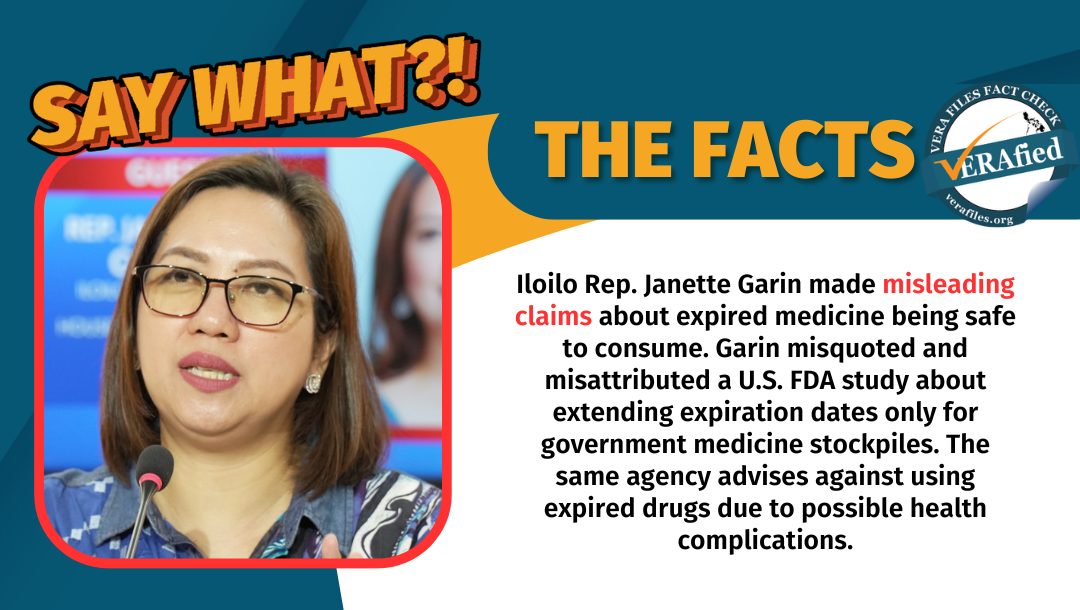In the course of criticizing the recent results of a Pulse Asia survey on Charter change, Iloilo Rep. Janette Garin, a physician and former Health secretary, cited a supposed study by Harvard University claiming that expired medicines are generally safe to consume. This is misleading.
Garin misattributed the study, which was actually conducted by the United States Food and Drug Administration (U.S. FDA) to test the safety of medicine stockpiles of the country’s military. The same agency advised against taking medicines past their expiration date.
STATEMENT
In a press conference on April 1, Garin was asked about her stance on the March 2024 Pulse Asia survey showing that opposition to Charter change had almost doubled to 88% last month from 45% a year ago. The lawmaker criticized the opinion poll’s methodology and questionnaire for the confusion caused by the inclusion of issues raised during the Duterte administration that are now irrelevant. She likened this to the debate on the efficacy of expired medicines, citing a study to illustrate her point:
“Actually there was a study done by Harvard. Hindi ko lang alam kung ano, as ginamit ito, kasi, syempre ‘yung military nagpe-preposition ‘yan ng gamot, tapos ‘pag expired na, pabago ka nang pabago ng inaral. May mga gamot na pwede mo pang gamitin as long as 15 years. Pero ayaw naman natin ng gano’n. So, ang totoo niyan, hindi ibig sabihin na kapag ang expiration date ay February 2024, hindi mo na siya pwedeng gamitin.”
(Actually, there was a study done by Harvard. I just don’t know… of course the military would preposition medicine, then when it expires, research would uncover new information. There are medicines you can still consume even for as long as 15 years. But, of course, we would not want that. So the truth is, just because the expiration date says February 2024, it does not mean you cannot use it anymore.)
Source: House of Representatives official YouTube page, PRESS CONFERENCE (APRIL 01, 2024), April 1, 2024, watch from 34:47 to 35:15
FACT
Public records show that Harvard University did not conduct such a study.
However, the Harvard Medical School did publish a commentary about a 2002 scientific article discussing expired medicines. Originally published in 2003, the piece was updated on Aug. 29, 2020 and discussed an article from medical journal Pharmacology Today, which echoed an exposé published by the Wall Street Journal (WSJ) in 2000.


The WSJ reported on a 1985 U.S. FDA study proving the efficacy of over 90 kinds of drugs even 15 years past their expiration date. The FDA concluded that expiration dates set by manufacturers typically had no bearing on the usability of drugs.
The study was initially a collaboration with the U.S. Air Force and continues today as the Shelf-Life Extension Program of the U.S. Department of Defense.
Under the program, FDA-approved drugs are periodically tested to check if their shelf lives can be extended for emergency government reserves. This is done “to avoid the need to replace entire stockpiles every few years at significant expense,” as indicated on the FDA website.
Official results of the research can only be accessed by the involved U.S. federal agencies.
Extension of the expiration of drugs available to the general public, however, requires FDA approval. The agency generally warns against consuming expired medicines due to possible bacterial growth, changes in chemical composition and decreased effectiveness.
Sources
Harvard Health Publishing, Drug Expiration Dates – Do They Mean Anything?, updated Aug. 29, 2020
Medscape Pharmacology Today, Do Medications Really Expire?, Sept. 9, 2002
U.S. Food and Drug Administration, Expiration Dating Extension, updated Jan. 29, 2024
U.S. Food and Drug Administration, Don’t Be Tempted to Use Expired Medicines, updated Feb. 8, 2021
Wall Street Journal, Many Medicines Are Potent Years Past Expiration Dates, March 28, 2000


